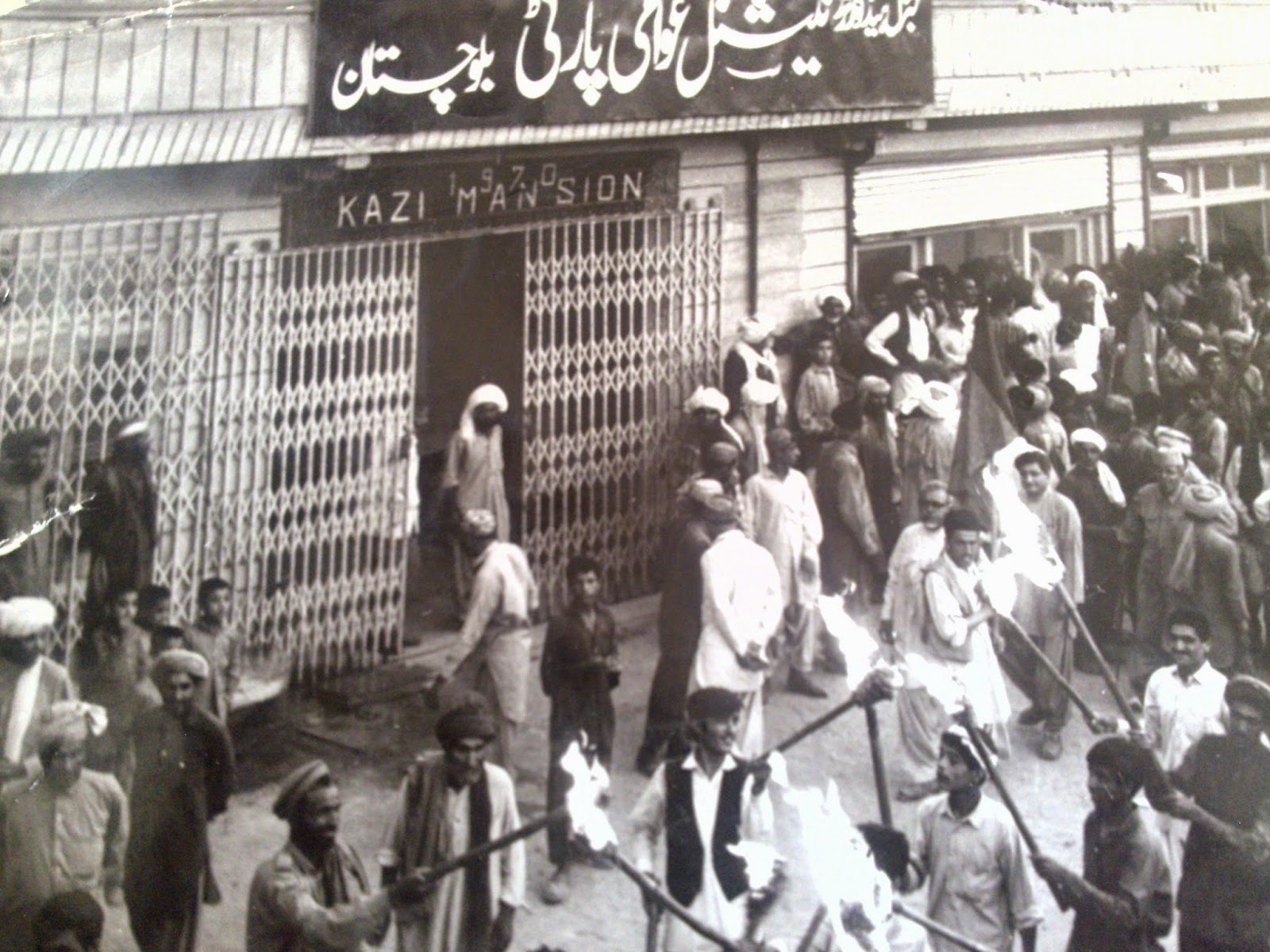Mir Ghaus Bakhsh Bizenjo was born in
1917 in a distant and very backward village of “Shanak” in Kalat State. He
belonged to the Hamalani Branch of “Sardarkhel” sub-tribe of Bizenjo
tribe. He lost his father in his early
childhood and his assets were placed under supervision of Court of Wards. He
acquired his primary education from Quetta. After the destructive earthquake of
1935 he stayed in Karachi for a while before moving to India and resumed
further education in Alligarh Muslim University. He got indulge in politics while he was a
student and has been very active in the national independence struggle for freedom
of South Asian Nations from imperialism. Since beginning he had been fond of
Congress and its nationalist leadership. From 1939 to 1942 he was expelled from
Kalat State. In 1941 Kalat State National Party (KNP) allied with All India
State People Conference. Mr. Bizenjo was named member of KNPs
working committee for the conference. In 1947 he was elected the member of Kalat’s assembly (House of Commons) and when the issue of Kalat’s annexation with Pakistan arose, he strongly opposed it as the leader of opposition and delivered his historic speech on this issue. After Kalat was forcefully annexed with Pakistan, Kalat State National Party was banned and Mr. Bizenjo was arrested. In 1956 Mr. Bizenjo and Prince Mir Abdul Karim formed a party named “Ustaman Gul” and in 1957 in collaboration with the leaders of other progressive parties formed National Party and merged Ustaman Gul in it. Afterwards a fraction from Awami League under headship of Maulana Abdul Hameed Bhashani linked with this new party, creating National Awami Party (NAP). In 1966 Mr. Bizenjo was elected as Member National Assembly of West Pakistan and in the same year when National Awami Party fragmented in two fractions, he became the General Secretary of Wali Khan Group. In result of struggles of Mr. Bizenjo and his associates one unit was demolished in 1970 and Balochistan was reinstated to its original status of a province and elections were conducted. Mr. Bizenjo got elected as Member National Assembly from Makran and was later appointed as Governor of Balochistan in 1972. He played a vital part in establishment and endorsement of constitution in 1973. After completing his tenure as Governor on 15, February, 1973 he was elected parliamentary leader of National Party. He along with other leaders was arrested in 1973 when the constitutional and elected government of Balochistan was tumbled. He was tried for sedition, under the famous Hyderabad Conspiracy Case and was set free on 5th, February, 1978. He stayed with National Democratic Party for a while after his release, but parted when differences arose with its leadership. In 1979 along with Mir Gul Khan Naseer and Sardar Ataullah Mengal constituted his new party, Pakistan National Party and remained its head till end.
The
period of General Zia ul Haq was indeed most awful for pro-democracy
politicians. Two noteworthy leaders of Balochistan, Nawab Kher Bukhsh Mari and
Sardar Ataullah Mengal opted for self-exile in disappointment, whereas Mr.
Bizenjo along with the progressive and democrat powers in the country fought
against Zia’s dictatorship while facing imprisonments at numerous junctures. In
1983 he actively participated in the move for restoration of democracy and
boycotted the pretended referendum and nonparty based elections of 1985. During
this period Mr. Bizenjo courageously and bravely fought against extremist and
infuriating modes of politics in Balochistan. He stayed persistent even under
extreme pressures up to such an extent that the extremists and feudal elements
along with tribal chiefs and imperialism backed powers allied together to form
a huge front against Mr. Bizenjo. It was for this alliance that he said; “Extremist, either of left wing or right
wing, is always an opportunist”. Although Mr Bizenjo suffered a sore setback on
the hands of this alliance in the elections of 1988, but this defeat was unable
to harm the due standing of Mr Bizenjo, rather the extremist elements in the
politics of Balochistan, indulging in democratic and Parliamentary politics and
contesting in elections, was the political victory of his ideas. Mr Bizenjo did
not regret on his own and parties defeat in election and started reorganizing
the party. While commenting on disappointing results of the party Mr Bizenjo
said;
“We
have just suffered loss at one front not the entire war and only we can win
this war because the roots of our politics lay deep amongst the public, we struggle
for public empowerment. Defeating public is as impossible as rebirth of dead.”
The
great leader of the Baloch nation died on August, 11, 1989 and thus this illuminating
chapter of history came to its end. Mr. Bizenjo thought a lot to the people of
Pakistan and Balochistan through his political struggle. Now it is the duty of
progressive and democratic forces in the country to keep this light of
democratic struggle brightened.


No comments:
Post a Comment